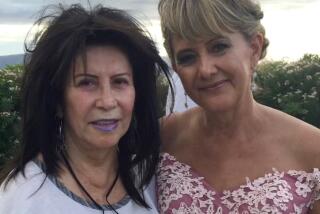Marvelous party known as Merv
- Share via
In 1985, Merv Griffin was granted an exclusive interview with President Reagan for “The Merv Griffin Show.” As its producer, I was summoned to the West Wing to meet with Reagan advisors. The ground rules session lasted all of 30 seconds (“Merv can ask whatever he wants”), but the meeting lasted almost an hour, because the staff, all fans of the show, wanted to know what Merv was really like.
Ironically, in that very question resides the secret to Merv’s success, because he possessed an insatiable curiosity about what made the celebrated tick, what they were really like.
His curiosity began as a child growing up, in very modest circumstances, in San Mateo, Calif. Merv’s father was a tennis professional who taught the area’s well-to-do. Sometimes Merv went with his father to the estates of the rich and famous, and he wondered about those people. Once, his family went to the posh Pebble Beach Lodge, where Merv spotted a couple of movie stars, up from Hollywood. He was dazzled -- “Those people had an aura I’ll never forget,” Merv told me -- and he wanted to know about them.
From the very start, Merv was a showman. At age 5, he put on backyard shows for the neighborhood kids -- he charged them a penny, and soon raised the price to three cents. When the kids didn’t balk at the price increase, Merv the entrepreneur was born.
When Merv sat across from Sophia Loren or Henry Fonda or Martin Luther King, the energized curiosity we all saw on the screen was real. He did not socialize with the guests who appeared on his show, because he felt it would only dampen the freshness of his interviews. I think there was always part of Merv who saw himself as the kid on the other side of the fence, watching the rich and famous, wondering about them.
When his empire grew and the business press interviewed him about the secret to “becoming a mogul,” he told the truth: He just wanted to have fun. He liked doing puzzles and playing games. He created “Jeopardy!” and “Wheel of Fortune” not to build an empire, but to have fun. Once, during the Joseph Campbell “Power of Myth” craze, I suggested he watch the PBS series. He did. He called me and said, “I’ve been following my bliss all these years and didn’t even know it.”
One of the reasons his show worked so well is that it reflected who Merv was. All of his wide-ranging interests -- in celebrity, music and trends that caught his eye -- were represented by the eclectic guests on “The Merv Griffin Show.”
His days were equally varied. He’d come into my office in the morning, look at the shows being planned for the weeks, talk about the famous guests. Then he’d head to the offices of Murray Schwartz and Bob Murphy, the men who helped him build his business, and talk numbers. Then it was down to the game show division to fool around with new ideas. His favorite part of the day was rehearsal, because he’d sing with the band -- Merv always populated his band with world-class jazz musicians like Ray Brown, Jack Sheldon and Herb Ellis. Merv would play the piano, sing and joke with the crew. (He was following his bliss.)
An hour before the show taping, Merv met with the staff, reviewed notes. He was focused, and retained vast amounts of information quickly. God help the staff member who didn’t prepare a thorough set of notes. The genial host was a steely professional when it came to preparation.
When the taping ended, Merv left the building as quickly as possible. He never wanted to be the last guest at the party.
In 1986, Merv Griffin taped the final episode of his long-running talk show. It was a compilation of clips from the thousands of shows and interviews he’d done since 1962. Before the taping, I sat with him in his dressing room as he geared himself up for the final entrance.
“Do you know what this feels like?” he said to me. “It’s like I’ve been at the best dinner party ever given, and it’s about to end.”
I think a lot of television fans felt the same thing when “The Merv Griffin Show” went off the air. And for those who knew him personally, the feeling goes a little deeper. One of his longtime employees said to me the day after Merv passed away, “The thing about Merv was, whenever he walked into a room, things got more interesting.”
Yes, because he was the perfect host.
Peter Barsocchini, the screenwriter of “High School Musical” and its sequel, was the producer of “The Merv Griffin Show” from 1980 to 1986, during which he won two Emmys.
More to Read
The biggest entertainment stories
Get our big stories about Hollywood, film, television, music, arts, culture and more right in your inbox as soon as they publish.
You may occasionally receive promotional content from the Los Angeles Times.










